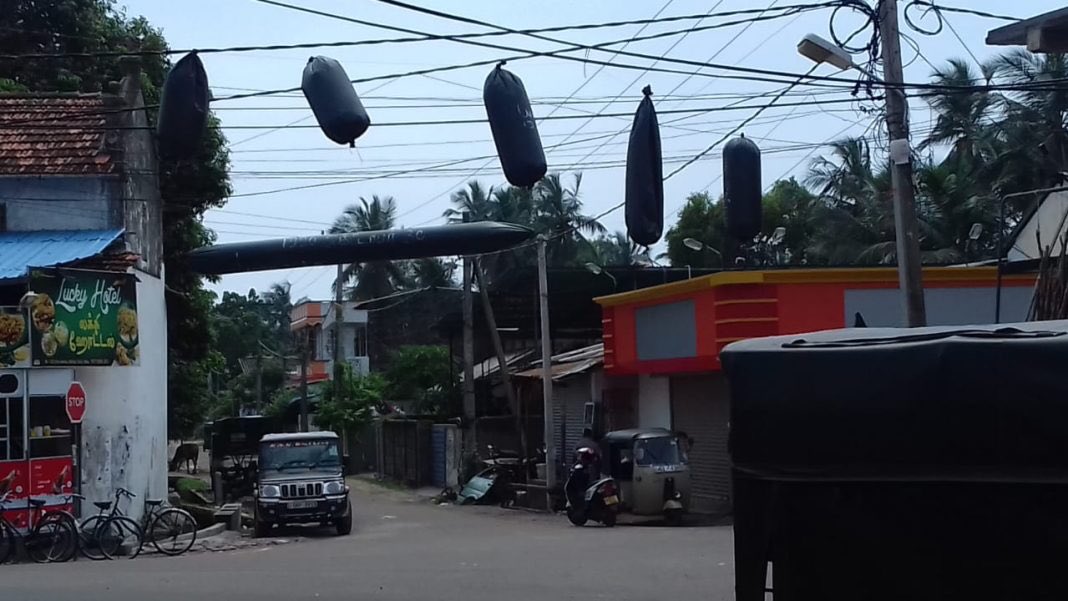
Black flags in Jaffna in 2018 to mark the expulsion.
Tamil and Muslim activists called for both communities to “forge new paths of activism”, as they marked 30 years since the expulsion of Muslims from Jaffna by the Liberation Tigers of Tamil Eelam (LTTE).
In October 1990, amid hostilities between Tamils and Muslims and growing paramilitary activity, the LTTE expelled some 20,000 Muslim families from the Northern Province – up to 75,000 people in total.
“The war had been cruel, and both our communities had been torn apart,” said a letter signed by the activists. “Both the communities had been uprooted from their domiciles repeatedly, in the bombing and shelling, in the brutality of state militarisation and in the brutality of militancy. 30 years later, we are still looking for answers to all our concerns and feel the need for solidarity.”
The letter goes on to state,
In that spirit we appeal to:
- the political leaderships of Tamils and Muslims to constantly engage in dialogue across ethnicities, and be inclusive in their actions, in a recognition that neither community can survive without collaboration. Our political leadership should constantly act against militarisation and authoritarianism in an inclusive manner.
- the northern bureaucracies to address the needs of the displaced, the returnees, to address the problems that make return difficult, and thereby facilitate an easy process of return.
- educational institutes and other civil organizations to make a concerted attempt to make dialogue, discussion and dissent central features of its democratic practice.
- To leaders of religious organizations to make an effort to build bridges among communities.
See the full text of the letter here.
Also see more from the Law & Society Trust and the People’s Alliance for Right to Land here.
The LTTE remained in control of Jaffna for 5 years after the expulsion, until the Sri Lankan government captured the town in 1995. Despite Sri Lanka's control of Jaffna for over 20 years, thousands of Muslims remain displaced today. Of the 20,000 Muslim families that were originally displaced from the district, only small fractions have managed to return. Over 14,000 Muslim families were displaced from the Northern Province in total.
In subsequent years the LTTE expressed regret for the events of 1990.
“Jaffna is their (Muslim’s) own land. Unfortunately difficult circumstances have rendered these Muslim people refugees. We very much regret that this has happened,” LTTE leader Velupillai Prabhakaran told the BBC in an interview in 1994.
Political strategist Anton Balasingam also apologised to the Muslims after talks with the SLMC leader Rauff Hakeem in 2002. "I made an apology to the Muslim people that what has happened in the past has to be forgotten, that we are willing to talk to them and resolve their problems," Mr Balasingam said, assuring Muslims that they could return to their homes in the North. He stressed that the Tamil homeland and the Tamil territory in the North-East "belonged to the Muslim people also".
During a 2002 press conference with LTTE leader Prabahakaran, Balasingham said, “We believe that the Tamil homeland belongs to the Muslim people and we believe that there is no dispute that Muslims have a right to own land”. He also said that Muslim representation in the peace process “is crucial”.
Mr Hakeem said at the time that they are willing to forgive the LTTE. "We have told them unequivocally that we are prepared to forgive and not forget (the past)... We have bitter memories of the past. But it is time we contended with the ground realities. That would mean that the LTTE also has to look at Muslims and their separate political identity as something that has become quite pronounced over a period of time," he said in an interview.
